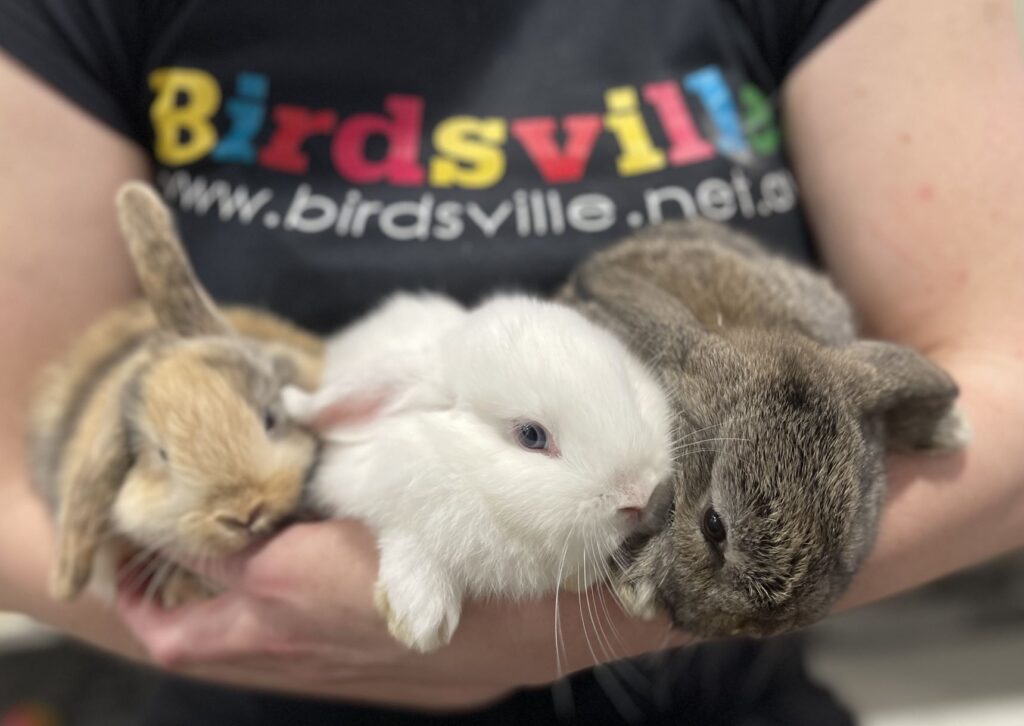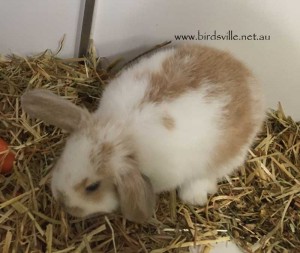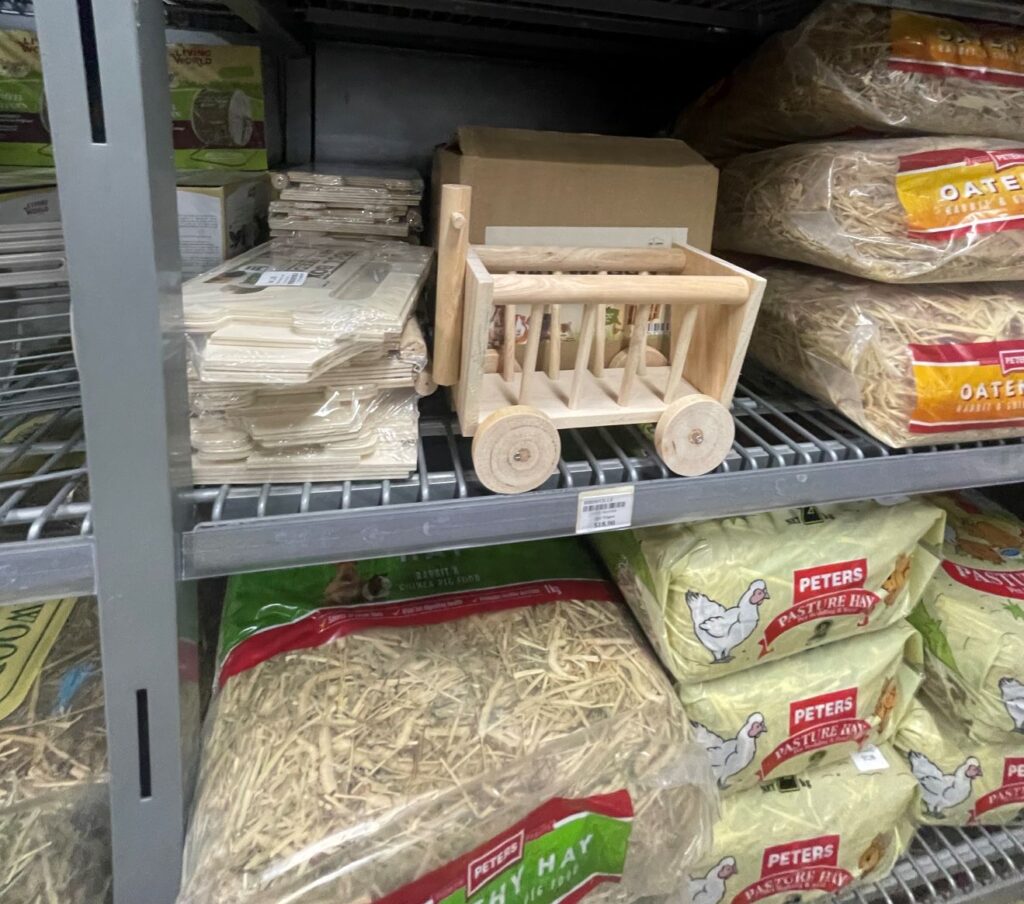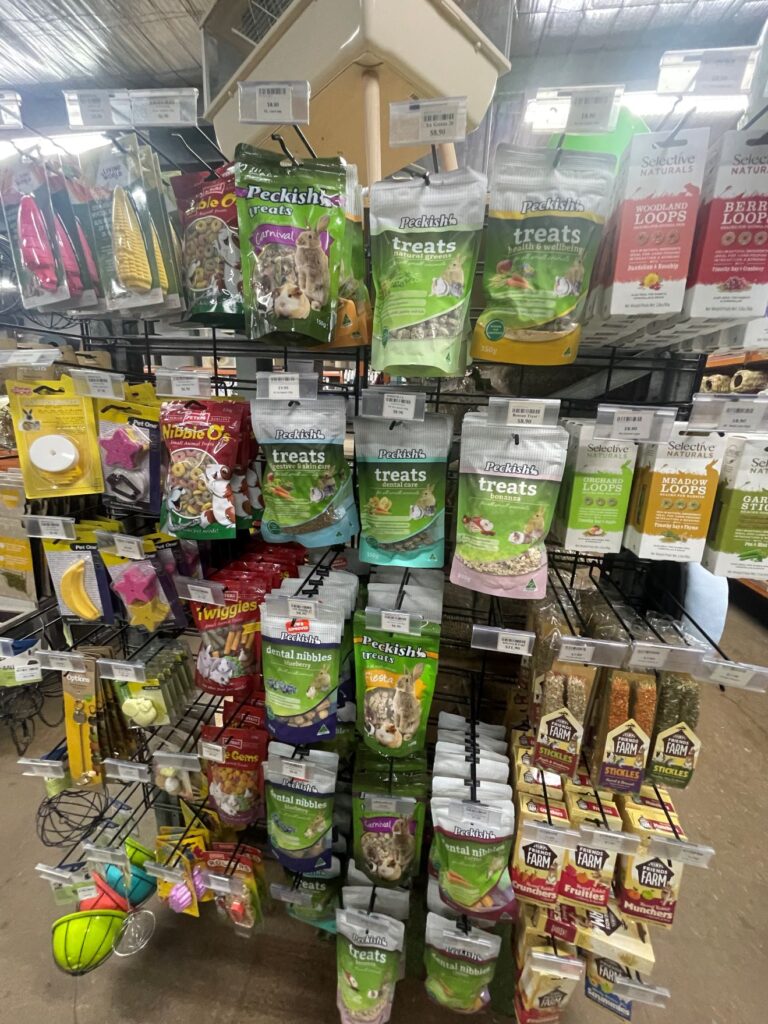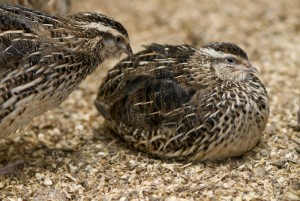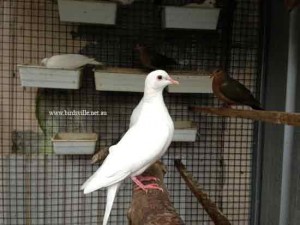We will cover all about Mini lop rabbits
- Mini lop rabbits as pets
- ideal rabbit set up and cage, indoor vs outdoor
- best substrate/bedding to use and where.
- Environmental enrichment with hides, and chew toys.
- Diet, what hay is best, what to feed, treats and what not to feed.
- Grooming.
- Mineral and vitamin supplements.
- Parasite control
- Hygiene
- Set up check list
- Training
- Health issues.
Mini Lop Rabbits Breeder Sydney
visit our Facebook and Instagram page for updated photos and what we currently have in stock https://www.facebook.com/BirdsvilleRosebery/.
We also do adoption of adult rabbits, as well as sell baby mini lop rabbits. If you’re interested in giving an older rabbit a second home, give us a call or visit in store to find out if we have any bunnies available. 
Our well socialized baby Mini lop rabbits are usually around 7 weeks of age. Bunnies are only sold fully weaned and ready to go. Do not purchase a rabbit too young in age as they will need rabbit milk replacer. We do stock this at all times.
Visit our team of experts in store and view our complete set up discounts.
Mini Lop Rabbit’s and Dwarf Lop Eared Rabbits are very similar in appearance, the main difference is the Mini Lop is small in size. Dwarfs lop bunnies are considerably bigger.
Mini Lop-Eared Rabbits are born with both ear upright and become softer and droopier as they get older. They are very sociable love company of not just other rabbits, but other animals and their owners. I once had a lop-eared rabbit which was best friends with my rooster its actually not unusual for them to develop friendships with other animals.
Diet for Mini Lop Rabbits
Diet for Mini Lop Rabbits needs to be consistent high in fiber and low in carbohydrate and sugars. To reduce digestive upset, change the diet gradually over a period of 2 to 3 weeks.
Rabbits as herbivores will graze up to seven hours a day and need a well-balanced plant-based diet, consisting mostly of 80% hay Oaten hay, Ryegrass, Timothy, Pasture or Ryegrass. Some hay has received a lot more marketing than other hays, but the truth is there is no wrong options unless your bunny has a health condition.

Hay for Rabbits
As a responsible rabbit owner, it’s of great important to be informed about your pet’s nutrition. One of the most important components of your rabbit’s diet is hay. Not only does it provide essential nutrients, but it also plays a significant role in supporting your furry friend’s digestive and dental health.
Hay is essential for a healthy rabbit diet, providing the necessary fiber rabbits require to maintain a healthy digestive system. Some of the different types of hay available include oat hay, rye grass hay, meadow hay, and timothy hay. All of these varieties are suitable for rabbits, but selecting the best type for your pet depends on your rabbit’s age, activity level, and health needs. Visit our team of experts in store for more advise and recommendations for your rabbit.
It’s also important to note that the quality of hay you choose plays a critical role in your rabbit’s health. Imported hay can pose a risk to your pet due to insecticides and pesticides used during the growing process. In addition, imported hay may not be as fresh as locally produced hay, potentially compromising the nutritional quality. To avoid these risks, we recommend purchasing Australian hay.
Australian hay is known for its superior quality, making it an excellent choice for your rabbit’s diet. It’s also less expensive than imported hay, making it an affordable option for pet owners. Choosing locally produced hay also supports the Australian agricultural industry, helping local farmers to remain in business.
Using a hay feeder can be a great solution to ensure your rabbit’s hay remains clean, dry, and protected from roaming pests. Hay feeders come in a variety of shapes and sizes, so you can find one to fit your space, budget, and rabbit’s needs.
They can be hung in the enclosure or placed on the floor. To prevent your rabbit from spilling its hay, make sure to secure the feeder to the enclosure in some way.
How much Lucerne, Alfalfa or clover to feed my rabbits?
Legumes such as Lucerne, alfalfa or clover s are a great addition to your rabbit’s diet. They are packed with vitamins but shouldn’t confused with hay and over fed.
Legumes are high in sugars, protein and calcium and can cause weight gain. How much of these foods you feed depends on your rabbit’s age, activity level, and health needs. Visit our team of experts in store for more advise and recommendations for your rabbit.
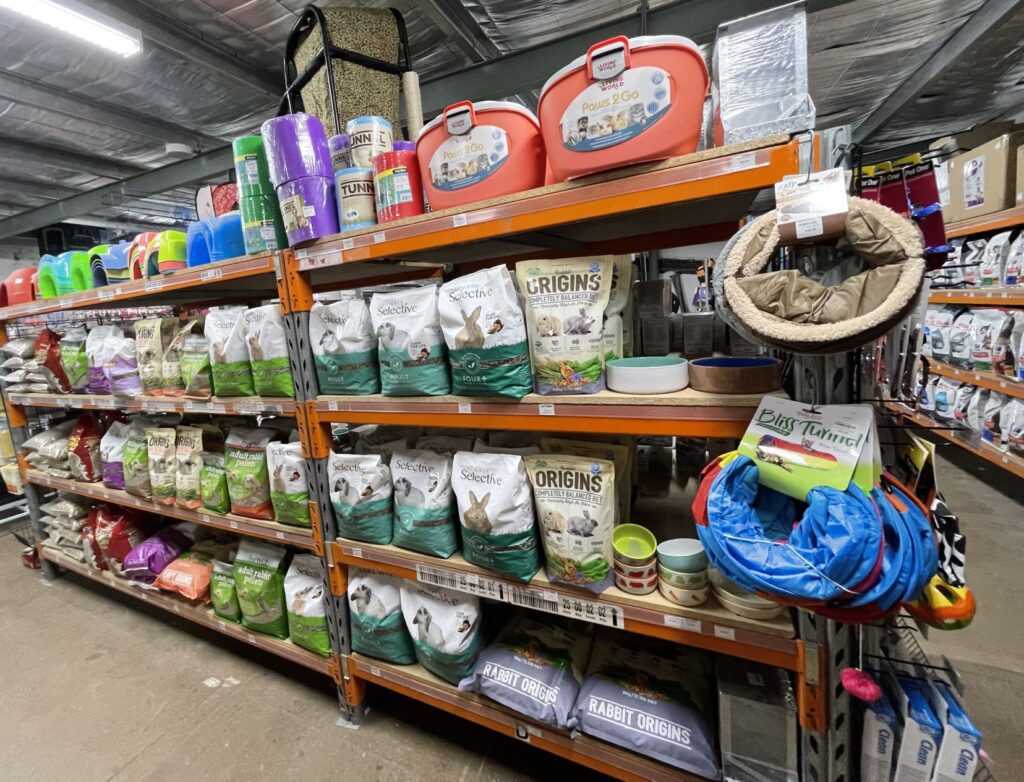
Best Pellets to feed your Rabbit.
Pellets are essential in a rabbit’s diet as they provide necessary nutrients like protein, fiber, and carbohydrates. They also help maintain healthy digestion, prevent obesity, and supplement any nutritional gaps in the rabbit’s diet. It is essential to ensure that the pellets are of high quality to meet the rabbit’s dietary requirements fully. High-quality pellets consist of natural ingredients, free from chemicals, preservatives, and unnecessary fillers. We recommend brands like Science Selective Rabbit Pellets, Vetafarm Rabbit Origin, Beaphar, Peckish Rabbit Pellets, and Birdsville Rabbit Pellets, as they meet the requirement of providing high-quality and nutritious pellets for rabbits.
Low-quality pellets can cause malnourishment, increase susceptibility to diseases, and digestive problems in rabbits. They contain fillers, chemicals, and preservatives that can cause health problems in rabbits. We highly recommended to avoid supermarket pellets and opt for premium brands that use natural ingredients.
At a glance, high-quality pellets may seem expensive. Still, when you consider the extensive benefits of providing a nutritious diet, it’s worth the extra cost. Besides, when feeding high-quality pellets, you would need lesser quantities due to their rich and wholesome nature.
Consider buying a heavy food bowls for pellets to prevent your rabbit tipping it over and spilling pellet everywhere.
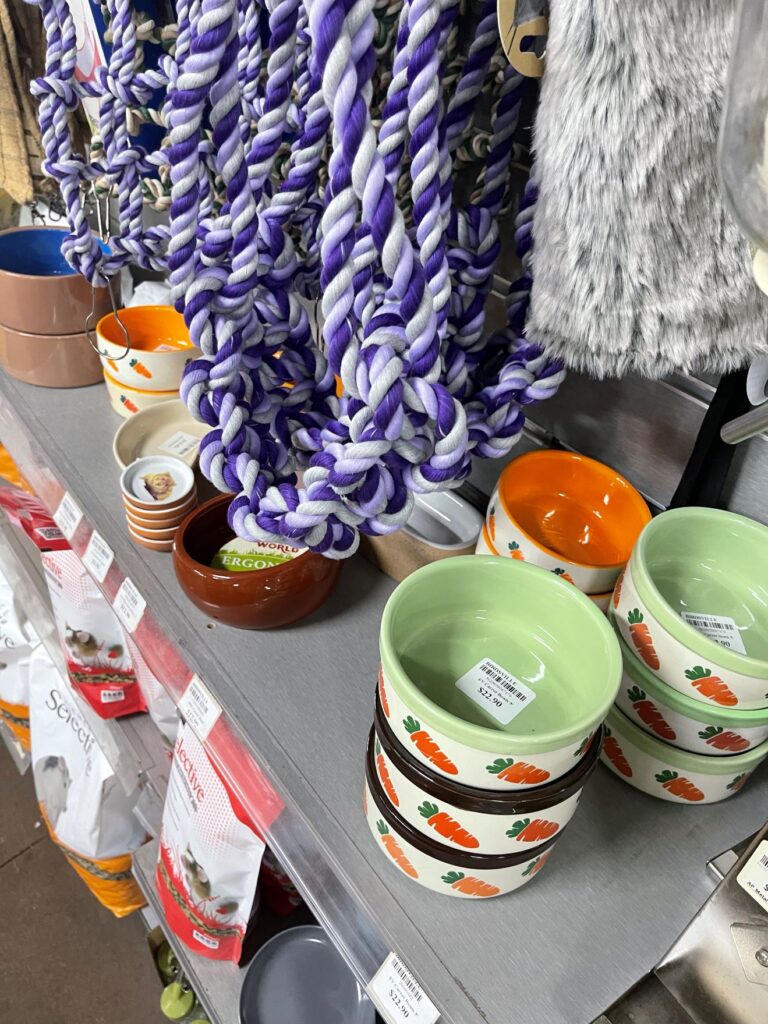
fruits and herbs for rabbits.
While commercial rabbit food can provide many nutrients, adding fruits and vegetables to their diet is crucial. At Birdsville, we recommend that a minimum of 10% of a rabbit’s daily diet should consist of fresh produce.
Best Fruits and Vegetables for Rabbits:
Leafy greens are essential to a rabbit’s diet and should make up the bulk of their daily vegetable intake. Dark, leafy vegetables like kale, spinach, and collard greens are excellent sources of vitamins A, C, and K. Feed herbs like basil, cilantro, and mint in small amounts. As for fruits, stick to options that are low in sugar, such as raspberries, blueberries, and strawberries.
Fruit, vegetables and other food to Avoid:
Not all fruits and vegetables are safe for rabbits. High-sugar options, like carrots and apples, should be given in moderation or avoided altogether. Avoid lettuce and other greens with low nutritional value, as well as toxic plants like daffodils, lilies, and tulips.
Rabbits should not be given cereals or grain-based mixes, including muesli and oats. Avocado, onion, garlic, sugar, corn, and beans can all be harmful to your rabbit’s digestive system. Additionally, rabbits should not be given bread, pasta, sweets, chocolate, biscuits, or nuts.
popular treats, believe it or not but this is a fraction of what we carry.
Rabbit Treats
Treats are a great way to bond with your rabbit, while also providing a healthy snack. Depending on their age and activity level, rabbits should have a few treats a day.
These treats provide your rabbit with a nutritional boost. They can also be a great tool in train your rabbit and promote positive behaviors. For example, you can reward your rabbit with a treat when they obey a command or trick. Treats are also a great way for your rabbit to have fun and explore new textures and flavors. It is important to remember, treats should be given in moderation. Too many treats can lead to unhealthy weight gain.
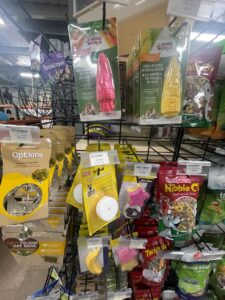
Salt and mineral licks for Mini Lop Rabbits.
Play a crucial role in maintaining the health and well-being of rabbits. These furry creatures instinctively know when they require additional salt and minerals, which aid in digestion, muscle, nerve and fluid regulation.
Licks provide a convenient and effective way to keep rabbits healthy, as well as avoid any potential deficiencies, but should be consumed in moderation.
In addition to being an important dietary requirement, salt and mineral licks also serve as a source of mental stimulation, as rabbits love to nibble and interact with them. It is strongly recommended that owners attach a salt or mineral lick to the side of their rabbit’s enclosure as a preventive measure.
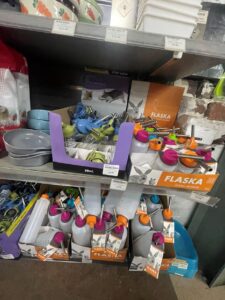
Drink bottle
You will also need a drink bottle or bowl for water. We recommend bottles, as bowls can tip over, the rabbit could step or lie down in it. During a hot day you could possibly lose your rabbit to dehydration, if they run out of water.
Enclosure for Mini Lop Rabbits
Choosing the right enclosure for your rabbit is an important part of ensuring their health and well-being. Rabbit enclosures should be spacious, well-ventilated, and provide ample access to your rabbit’s food, water, and hay.
Outdoor enclosures
Outdoor enclosures are designed to shelter the rabbit from the elements.
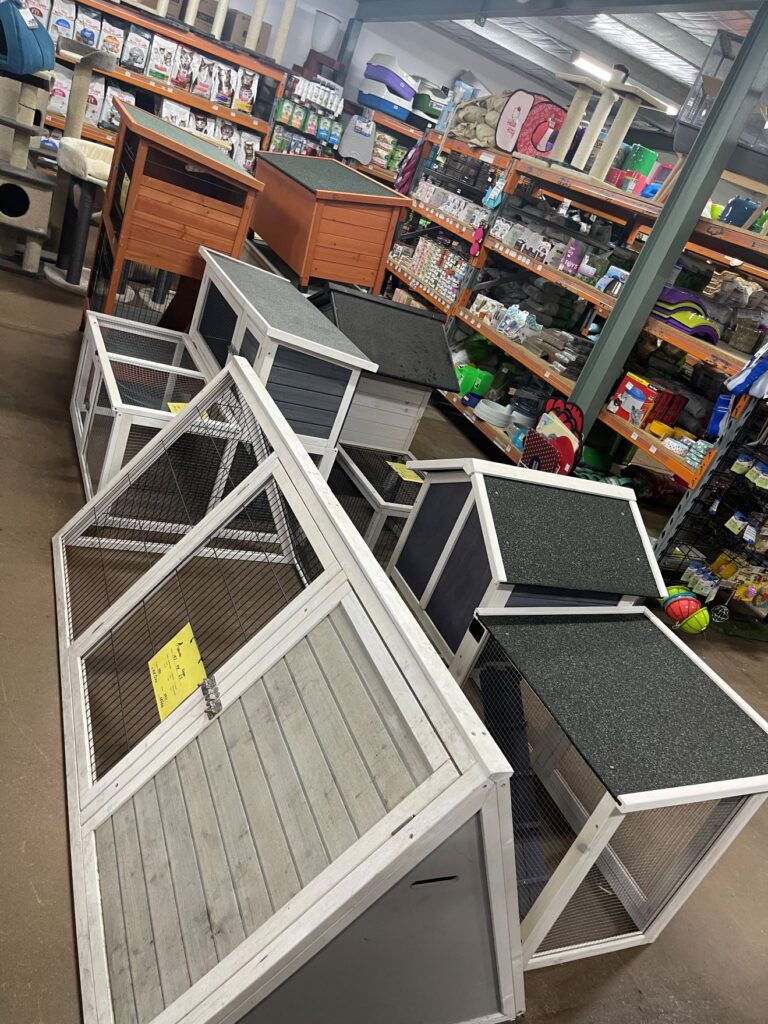
Indoor Enclosure
Indoor enclosures are designed to have an enclosed plastic base that’s easily removed for cleaning. The top of the enclosure is wire for lots of ventilation.
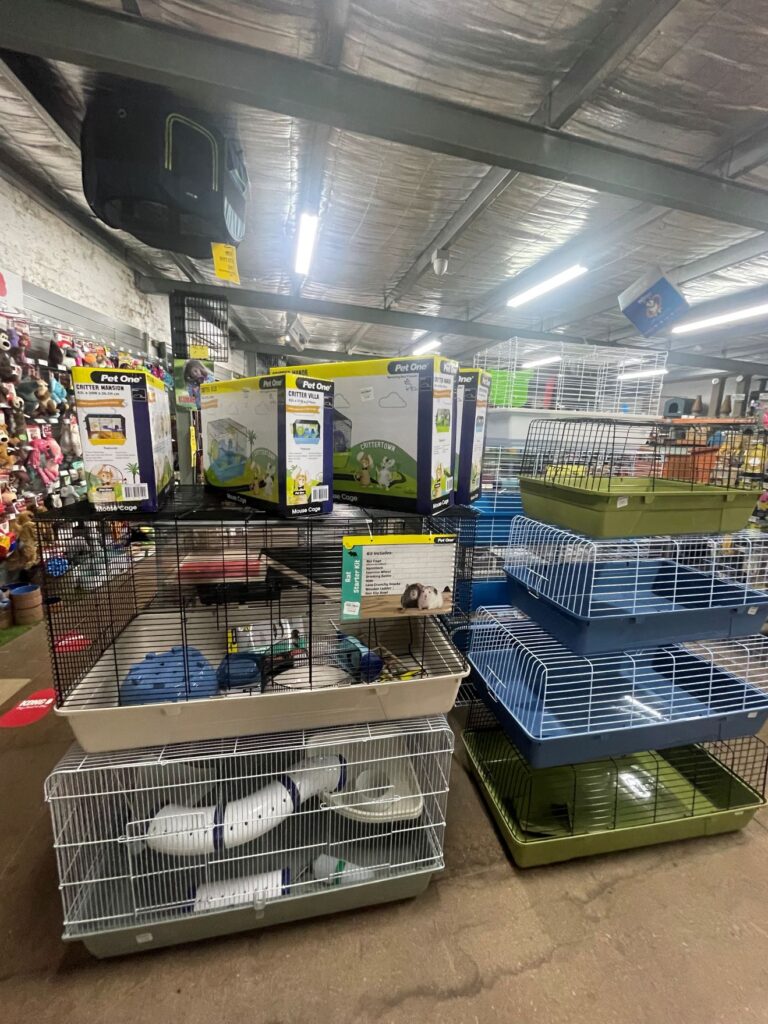
Enclosure set up
When setting up your rabbit enclosure, it’s important to make sure that it is spaciously designed to allow your rabbit to comfortably stretch and express natural behaviors. The enclosure should also be well-ventilated, while providing access to food, water and hay.
It is important to ensure your rabbit is able to get regular exercise, either inside or outside of the enclosure. For this, we recommend using the Petsville puppy or rabbit play pens. This is a great way to section off a safe area of your house for your rabbit to explore and exercise.
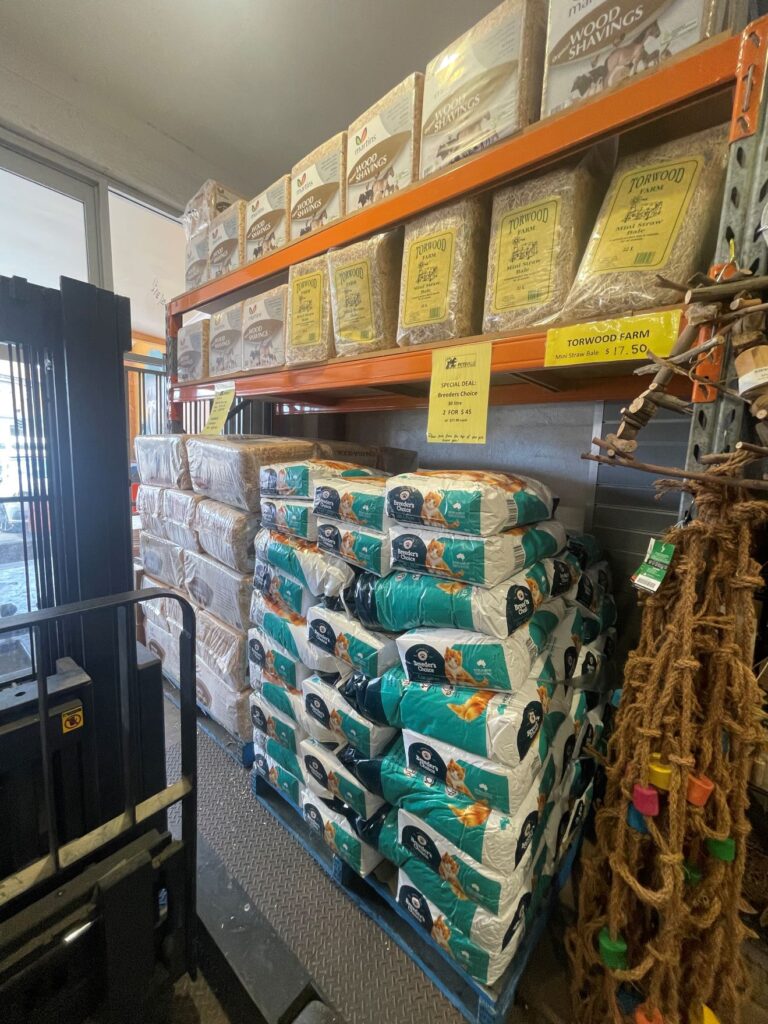
Line the bottom of the enclosure with absorbent bedding to keep your rabbit clean and dry.
For an outdoor hutch, straw can be used. In an indoor enclosure straw, dust extracted sawdust, hemp or paper littler bedding are all very good options.
Bedding depth can be around 5 to 15 cm.
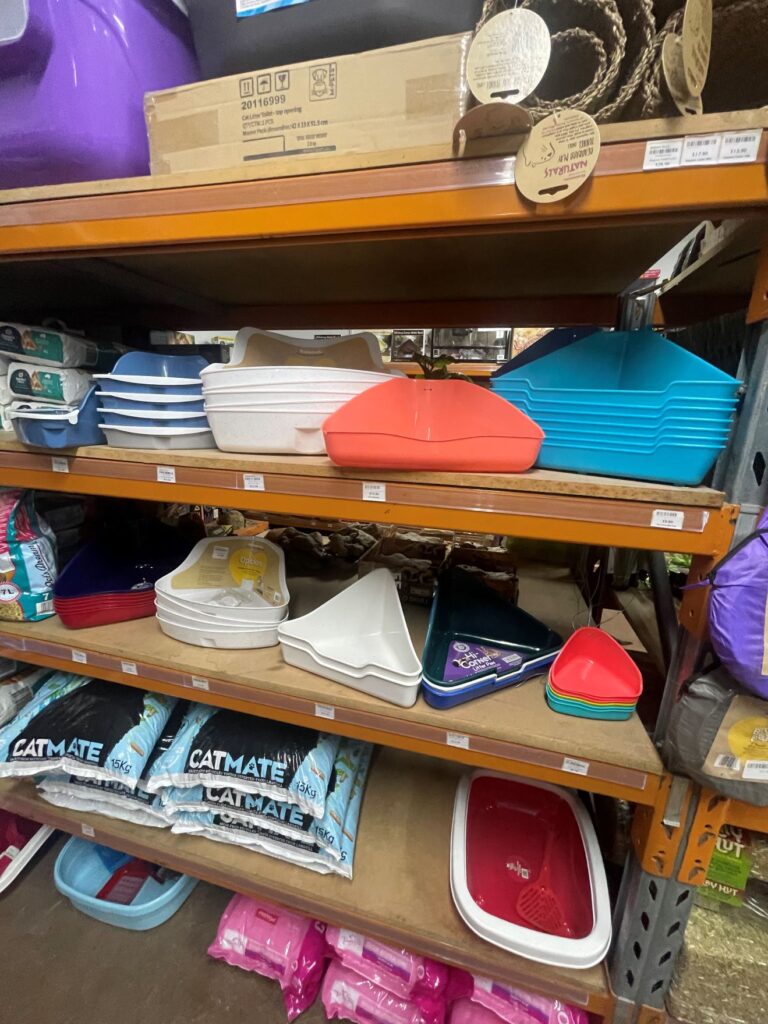
Next a litter box.
When your rabbit is trained to use a little box, your maintenance will be very easy. Inside the litter, use a highly absorbent bedding, that is different from the bedding in the rest of the enclosure.
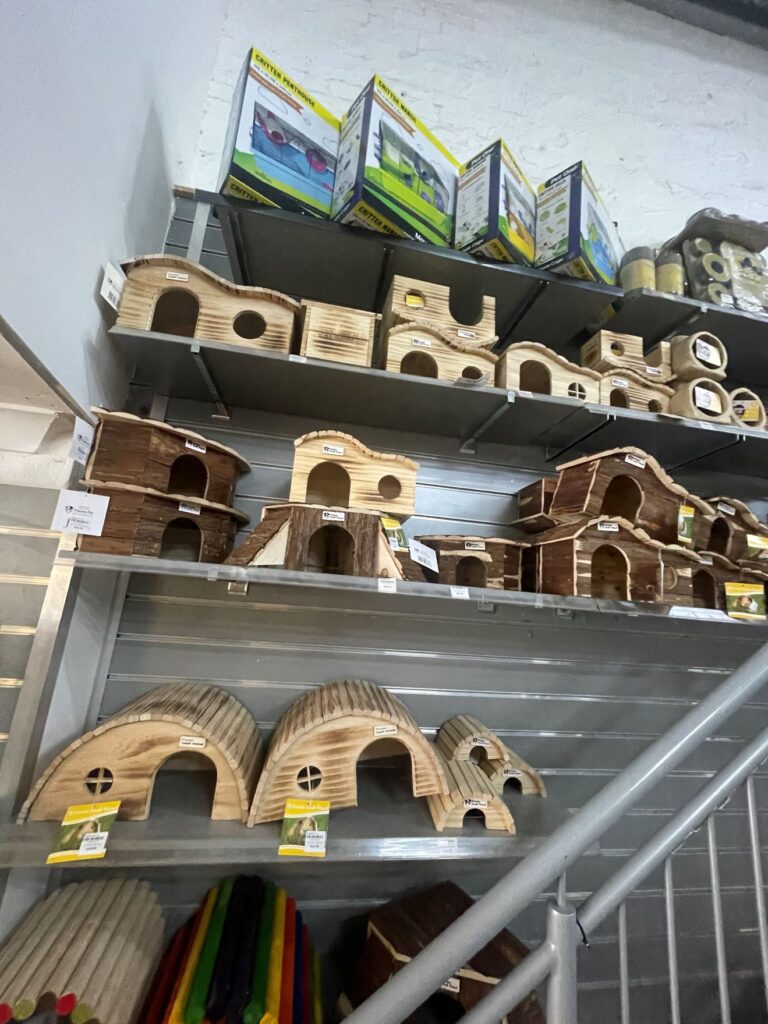
A hide in the enclosure for them to feel safe, as they are burrowing animals and like an enclosed area.
Hides and tunnels
When choosing a hide make sure the rabbit can fit inside, as burrowing animals they do like to feel snug. They also love to run through and hide in tunnels. We have a wide variety of wooden and plastic hides. We prefer the wooden, as it’s an extra item to chew on.
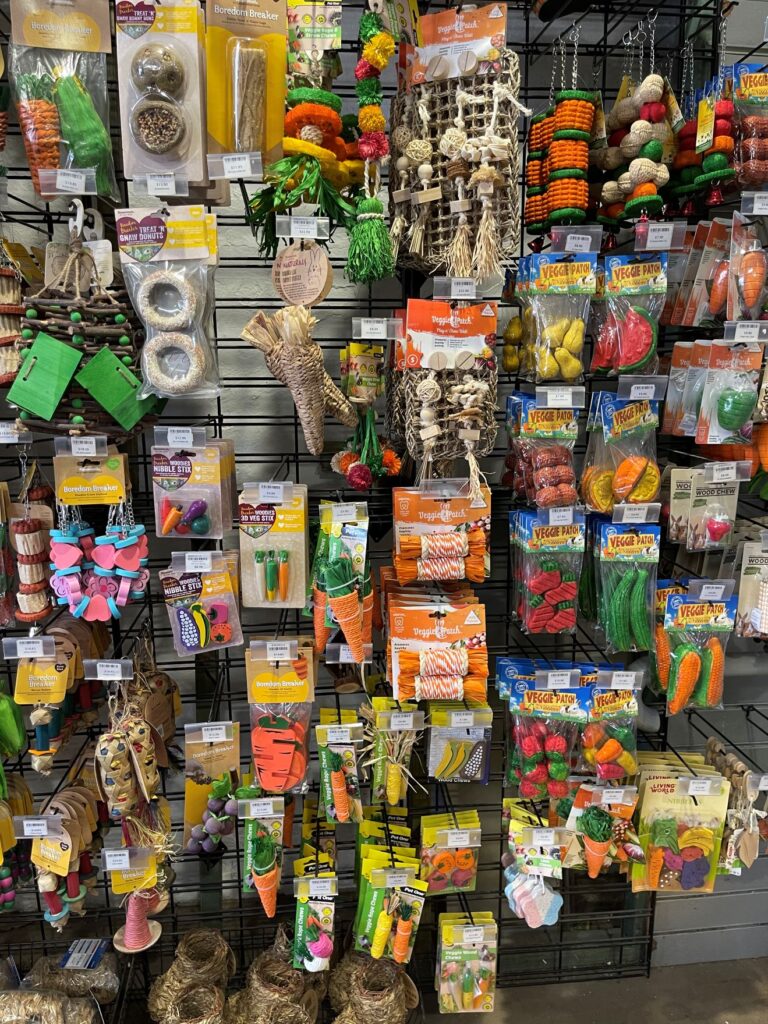
Toys for Rabbits
Rabbit are intelligent animal and toys are essential for them! They help to keep their teeth trim and provide them with essential environmental enrichment. Toys help to keep rabbits entertained while they are in their enclosure and prevent behavioral issues such as chewing. Preventing expensive vet bills for overgrown teeth.
Providing your rabbit with toys helps to create a tamer, friendlier, and happier rabbit. It is important to make sure that toys are rotated regularly to ensure your rabbit doesn’t get bored. If your rabbit destroys the toy, it is a sign they like it and should be replaced! Toys are an important part of a rabbit’s life and should not be neglected!
Grooming your Mini Lop rabbit.
Rabbits have beautiful fluffy coats and should be brushed once a week. They will gradually lose their baby fur as they grow and acquire an adult coat. It’s recommended to groom with a wire brush to remove patches of fur when they shed.
You may want to give your rabbit a bath from time to time, make sure you only bath them with rabbit safe shampoo that has the correct PH. Human, dog and cat shampoo can harm their sensitive skin.
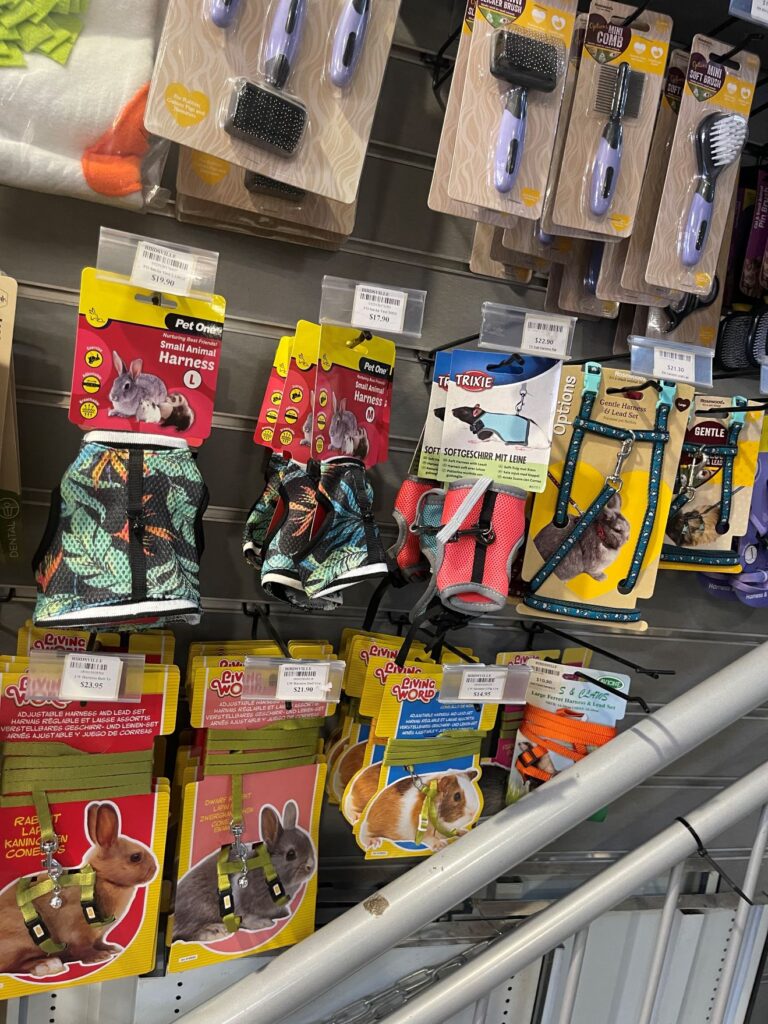
Harness training your Rabbit.
Giving them the opportunity to explore the outdoors safely and securely. To begin, start by introducing your rabbit to the harness and leash indoors. Allow your rabbit to get used to the feeling of the harness and leash by leaving it on for short periods of time, gradually increasing the duration of time with each use.
Once your pet is comfortable wearing the harness indoors, you can start taking them out on short walks in grassy areas. Always be aware of your surroundings and keep your rabbit away from other animals, and don’t rush the process. Harness training your rabbit is a rewarding experience and can give them the chance to explore the great outdoors safely and securely.
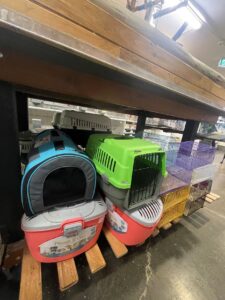
Rabbit carriers
Every bunny owner needs to chew proof carrier. They come in handy for unexpected or expected reasons, such as a short-term holding area while cleaning the enclosure, bunny adventures in the car or coming to a trip to Petsville to get your bunny’s nails trimmed.
Worming
Rabbits need to be regularly wormed to protect them from harmful parasites, which can be spread by the common house fly. Worming your rabbit is an essential part of their care and should be done 4 times a year to ensure optimal health!
Baby rabbits should be wormed 10 days after bringing them home, once they have settled into the new environment. If you worm a rabbit too young or to soon after being moved to a new environment can upset their stomach.
An adult rabbit can worm straight away, even if it has already been wormed, just to be safe.
Worming your rabbit is easy – just follow the instructions on the worming liquid bottle label. It’s important to worm your rabbit to ensure their health, but also to ensure the health of your whole family since these parasites can be passed to humans and other pets too!
Rabbits should be wormed 4 times a year.
Mite, Mange and Flea Treatment
Spraying your animal with lice & mange spray every 12 weeks as a preventative is recommended, as they can be easily transmitted, even if you don’t have any other pets.
Mites and mange are spread by another animal and the common house fly.
Mites and mange spray is simply sprayed evenly on the animal avoiding the eyes, the bottle has easy to use instructions on the label.
Rabbits can also contract fleas and flea treatment can be purchased in store. This is recommended as a monthly treatment. Fleas can be an issue if you have cats and dogs as the fleas will jump over to the rabbit.
Mini Lop Setup Essentials
Carry Cage – every rabbit owner needs one for safe transport, also useful for bunny adventures or to hold during enclosure cleans. A cardboard box is not recommended, as they can chew through one very quickly.
Enclosure/Hutch – please consult staff on enclosure recommendations.
Quality Rabbit Pellets – Selective Junior (under 6 month), Selective Adult (over 8 months), peckish, Rabbit Origins, Birdsville Small Animal Mix. We only stock the best.
Hay – Oaten, Ryegrass, Timothy, Pasture or Ryegrass. 70% of their total diet. It is an important source of fiber assisting in digestion.
Salt Lick / Mineral Block – essential for rabbits to have in their enclosure, just in case they are lacking any dietary imbalance and need extra salts or minerals.
Treats – great for training and rewarding your rabbit.
Hay Feeder – helps keep your rabbit hay fresh and prevent it from getting soiled.
Drink Bottle – these guarantee your rabbit has clean water all day long.
Bowls – for pellets and fresh veggies, they need to be not too high and heavy, so they won’t be knocked over.
Litter Tray – for toilet training, need an appropriate size litter tray for your rabbit when it is full grown.
Litter – wood or paper pellet litters are the best and the safest for is rabbits litter trays. The litter in the tray need to be different from the substrate used in the enclosure, so the rabbit can differentiate from the two.
Toys – rabbit are very social and love to lay. A minimum 4 – 6 appropriate toys for chewing, throwing, rolling and general playing is a must.
Hide – a small safe place for your rabbit to hide. These can range from tents, pouches, and hides and are made from a variety of materials and in different sizes.
Substrate – straw, sawdust, paper pellets, mini hemp, oz hemp, wood pellets or Kaytee litter.
Hutch Cleaner – CSI, Vetafarm, F10 and Aristopet are all rabbit safe, nontoxic disinfectant to remove sticky acidic urine and feces from enclosure. Normal household disinfects can be quite toxic to rabbits.
Wormer – Worming treatment needs to be completed 10 days after bringing your rabbit home and then repeated every 3 months for internal parasites.
Mite & Mange – Mite & Mange treatment need to be completed 10 days after purchase and repeated every 3 months to prevent external parasites.
What you may like to consider:
Enclosure stand – stands are available for some indoor enclosures, these are great to lift the enclosure off the ground, to an easy level to interact with your pet.
Spare bowls (food & water) – swap bowls, if normal one gets dirty and need a soak (easy cleaning) or to add an addition food.
Vitamins – vitamins are need when lower quality food is being feed or as a top up to the diet.
Rabbit shampoo or dry bath- occasional you may need to bathe your rabbit. Human and other animal shampoo are too acidy on a rabbit’s sensitive skin. we stock Rabbit shampoo & Rabbit Dry Bath
Treat & Veggies Holders – an additional way of suppling treats and veggies that can make them more interacted for your rabbit and keep them off the ground, reducing waste.
Harness & Lead – added safety when outside with your rabbit from predators and to prevent rabbit from running off. Harness training does take a little time and should never expect your rabbit to take to it straight away.
Bed – For the luxurious Rabbit who likes comfort.
Tunnels – great for rabbits to run through, play and hide.
Play Pen – allows an extra safe place outside their enclosure for indoor and outdoor use.
Synbiotic / Probiotic – Can boost immune system, support digestive function when use daily.
First aid – Spark, Triple C, F10 barrier ointment and heat lights are a few things that can be kept on hand in case of an emergency.
Vaccination/de-sexing Mini Lops
It is recommended to vaccinate your rabbit at 12 week of age and to keep it indoor or covered with mosquito net until this is done.
Please talk to your vet about de-sexing your rabbit at the vaccination visit.
There are some new vaccines out now, where you can vaccinate straight away, check on your local vet.
Teeth Health of Mini rabbits
Rabbits’ teeth grow constantly throughout their lives, so having hard wooden toys are very important to wear their teeth down. Overgrown teeth in rabbits are not only painful for them but become an expensive vet bill as vet treatment is the only solution. Rabbits need toys to chew and the proper high fiber diet not only for their diet but to stop their teeth from over.
Training Mini Rabbits
Understanding sight, touch and smell is essential before training.
Rabbits are very social intelligent. With understanding and the right approach, you can train them quite easily. Sadly, many people fail to train them, because they have adopted the wrong approach and do not understand the nature of rabbits.
Firstly, you need to understand how a rabbit views and smells the world. As a prey animal, rabbits have eyes on the side of their head. You may notice them bob or move their head around when you approach, this is your rabbit’s way of getting a better view of you.
Rabbits have poor eyesight when looking ahead straight, they can see 360 degrees. This is so, in the wild, they need to be able to run and hide from a predator approaching from any direction.
A rabbit’s sense of smell and whiskers are used to detect anything in its immediate environment more so than sight. A dog will see the treat where a rabbit will smell and feel a treat. Placing treats right under the rabbit’s mouth and nose.
Before touching or patting your rabbit you need to calmly let the rabbit see and smell you, this will greatly improve your bonding allowing your rabbit to be calm as this will verify that you are a friend and not a predator.
Once you have been verified, then give your rabbit a treat and give your rabbit plenty of cuddles and snuggles, as they love affection once they feel safe.
Devoting a little time every day to training your rabbit will get best results. 2 sessions a day of at least 5 minutes of training your rabbit using your rabbits’ favorite treats.
Petsville have a huge selection of rabbit treats that will definitely help with trainings.
Training Example
If you want your rabbit to leap onto your lap when called.
1 – Give your rabbit a reward every time it comes to you.
2 – When it’s mastered your rabbit coming to you, give the rabbit a reward when he comes to you and stands up with his front legs on your legs.
3 – When he always stands up with his front legs on your legs, give your rabbit a reward when it reaches even higher.
4 – When he is reaching out as far as he can, encourage him to jump into your lap for his treat.
Always make sure you give your rabbit a treat immediately when your rabbit has performed what was asked.
If you give your rabbit a reward when they have done something else that you have not asked, then you will be re-enforcing the wrong behavior. Always use the same commands so your rabbit doesn’t get confused, such as sit, stay, come or up. As rabbits love affection it’s good to add praise when they are receiving their treat.
Some people use clicker training, Petsville have clicker trainers in stock almost always.
As your rabbit gets better with following instruction you can reduce the amounts of treats, but it is always good to continue treats from time to time to re-enforce the desired behavior.
Rabbit hygiene
Rabbits live in such close contact with their litter and bedding these must be kept clean and free from toxins. Cleaning your rabbit’s enclosure regularly, with the right non-toxic cleaner, is essential to avoiding unnecessary health problems. Ammonia in the fumes of urine causes irritation in the nasal passage which makes them more susceptible to infection. Rabbits, unlike many other pets have a very sticky acidic urine that will burn them and need a proper disinfect cleaner that is safe for small animals. These cleaners also remove the sticky acidic substance that will accumulate under the bedding. If it is left it will burn the rabbit’s skin. If your enclosure or rabbit gets stinky, you have left it too long between cleans.
Health issues or changes in your Rabbit:
If you ever notice a change in behavior, appearance, off their food, quiet, lethargic, wheezing, runny nose, runny eyes, drooling, skinny you need to take act.
Hairballs
Rabbits ingest fur as they groom themself and hairballs can accumulate in the stomach, which can cause gastrointestinal stasis. Avoid this by making sure rabbits have a high fiber diet with quality hay mentioned above. The fur should have no problems passing through the digestion tract. Regular brushing will help avoid this problem.
Loneliness
A scientific study has shown that lonely rabbits are more likely to die and live a much shorter life, so give your rabbit lots of affection and love. Even if you have a rabbit that doesn’t like to be touched, they still will love out of the cage time and space to exercise. Also provide them with plenty of toys to entertain themselves.
Fly Strike
Not common in Australia but can affected outdoor rabbits. It is a condition where flies bite the rabbit making it uncomfortable and itchy. Fly’s may also lay eggs, developing into maggots inside the wound. This can be prevented and Petsville stocks a product to get rid of fly’s that is animal safe or bringing your rabbit inside.
Overgrown teeth or claws
If you follow our guide on diet and toys its very unlikely you will have issues with teeth. Our Petsville team can check your rabbits’ teeth and claws if you ask us. We offer a rabbit nail trimming service 7 days a week in our Petsville store. Teeth correction must be done by a vet. Overgrown or crooked teeth can be cause by trauma, poor diet or a lack of toys for your rabbit to chew on.
Coat dandruff or fur loss
a sign your rabbit has mites or less commonly fleas. A regular mite, lice and flea treatment will prevent this, mentioned above.
Weight loss
Could be caused by the above overgrown teeth or a whole host of reasons including cancer, neurological disease, starvation, trauma, stomach ulcers, injury, kidney failure, tumors, dental disease, poisoning, respiratory disease to name a few.
Sore hock
sore feet or underside can happen from unsuitable flooring or not using small animal cage cleaner as the acid from a rabbit’s urine can burn them underneath.
Head tilt
can happen from a stroke or a protozoan infection, trauma, cancer, intoxication from consuming something that hasn’t agreed with them. The good news is with proper treatment many rabbits with head tilt can go on to lead a long and happy life.
Difficulty breathing
also known as the snuffles. Us not a cold, as rabbits do not get the human cold. Signs of the snuffles is wheezing (respiratory infection) with runny eyes the discharge can be white in color and jelly like.
Diarrhea or soft poo
Sometimes what looks like diarrhea could actually be loosely formed cecotropes. Cecotropes are not feces, but are rabbit made nutrients that your rabbit eats. It may seem gross to us, but this is normal for rabbits.
The cecotropes are produced in the cecum in between the large and small intestines. By consuming their poo, rabbit can extract vitamin B from the cecotropes, which they are unable to produce themself. Loose cecotropes looks like smelly, mucous poo and clings to their bottom or tail.
Unfortunately, this can make them difficult to eat and un-appealing for the rabbit. Loose cecotropes can be caused by change in diet, a diet too high in carbohydrates, too low in fiber, too high in fiber, too much water–rich vegetables, too much sugar-rich fruit and veg or too much grain.
Diarrhea could be the other reason. Diarrhea can be a worry and can lead to dehydration, diarrhea has a number of causes including but not limited to change of diet, improper diet, stress, too many pellets, viral, antibiotics, bacterial, parasitic, fungal, metabolic diseases, Human borne digestive viruses and bacteria and insufficient fiber.
A product can help sick or injured animals called Herbivore crittacare, we do stock this product at all times.
Sudden Death Syndrome
Small animals are more susceptible to sudden death syndrome. There are many reasons why this can happen including but not limited to fright, being spooked, heart attack, stroke, nightmare or nightfright. Often when an animal that has passed of sudden death a full necropsy report from a vet will come back showing no reason as to why the animal has passed. Sudden death can occur with any animal especially small ones. Unfortunately, one cannot guarantee life of any creature tomorrow as it is a living being and not a toaster. By following this full page, you have the best chance possible in keeping your pet happy and healthy.
Perform a bunny visual health check
If you are not sure how to tell what a healthy rabbit looks like and unsure how to perform a visual health check, we will happily show you. Please bring your rabbit into Petsville and wait at the front counter near the entry. We do not charge to do a visual health check, as this is a great skill set for any rabbit owner to have and can increase your ability in spotting if your rabbit is not 100%.
A rabbit visual health check starts with a pat from the rabbit’s head to tail. If you feel ribs and bones, then the rabbit is skinny and that is a big red flag. Also, check your rabbits’ eyes, nose and mouth, there should be no discharge or mucus coming out of any of them.
We do stock some basic medications, but we are not vets. We have been dealing with rabbits for a long time and are our team are skilled in doing visual health checks.
Antibiotics should only be prescribed by a vet for rabbits. We also have a list of vets listed at the bottom of this page, as they can do a whole series of tests to pick up something for a rabbit that is asymptomatic.
Sexing Rabbits
Please be aware our animals are not DNA sexed. Whilst we may give our expert opinion on the sex of a bunny to the best of our ability, and we are very good at it.
We also are happy to show/educate you how we sex our rabbits as well, but please remember this is not a guarantee, as young rabbits can be hard to sex.
No refund, credit or exchanges will be given if an animal is not your desired sex after 3 days of ownership.
With all our bunnies they come with a free vet consult and any unlikely issues we have our animal health guarantee.
Don’t hesitate to come and see us in store if you have any concerns, or question and bring you rabbit for us to see.
Rabbit boarding
Rabbit Boarding is available throughout the year, please click link above for details.
Recommended Vets in the Sydney area
Small Animal Specialist
Hospital 02 (9190 6806)
Level 1, 1 Richardson place North Ryde
1300 9453 838
22A Bridge Road, Glebe
02 9436 4884
57-63 Herbert St Artarmon
02 9516 0234
60 Princes Hwy, St Peters
02 9871 6036
772 Pennant Hills Road Carlingford
995 Bourke Street waterloo Sydney NSW 2017
